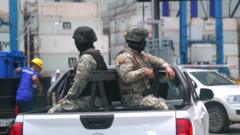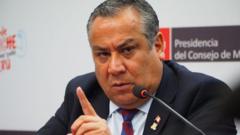As Ecuador increasingly serves as a vital passage for cocaine bound for Europe, gang violence and recruitment soar in the country, driven by rising European consumption. Local experts warn that foreign demand fuels this dangerous narcotics trade, leaving ordinary Ecuadoreans to bear the consequences.
Cocaine's Deadly Journey: The Expanding Role of Ecuador in Europe's Drug Trade

Cocaine's Deadly Journey: The Expanding Role of Ecuador in Europe's Drug Trade
Ecuador has become a major hub for cocaine trafficking to Europe, controlled largely by Albanian criminal networks. With rising demand in Europe and a surge in violence at home, the situation poses severe societal and economic consequences.
The cocaine trade is expanding in Ecuador as it becomes a key route for trafficking drugs to Europe, primarily controlled by the Albanian mafia. César, a member of the Latin Kings gang, reveals how coercion from the Albanian mafia has driven him to participate in smuggling operations. Despite Ecuador being a non-producer of cocaine, about 70% of the world's cocaine now passes through its ports.
Ecuadorean President Daniel Noboa has noted that the rise in cocaine trafficking is alarming, with police reporting record drug seizures. The violence associated with the drug trade has surged, resulting in a record number of murders, including 781 in January 2025 alone. Individuals like César point to growing European drug consumption as a critical factor in worsening conditions.
Ecuador's strategic location, combined with its legitimate export industries—especially bananas—provides drug traffickers an ideal cover for smuggling operations. Prosecutors have observed criminals masquerading as exporters to blend in. The profits from this illicit trade significantly boost criminal organizations while inflicting social harm on struggling local communities.
As cocaine shipments have increased by 30% in recent years, those involved in the transport, including unsuspecting workers, face heightened risks. The socio-economic turmoil following the pandemic has left many vulnerable to gang recruitment. Analysts note that low economic conditions and the influx of foreign gangs have exacerbated Ecuador's precarious situation.
Given the escalating consumer demand in Europe, particularly in the UK where cocaine use is rising, Ecuadorean authorities call for more responsibility on the part of these nations. Officials emphasize that reform efforts must focus on decreasing consumption, arguing that the violence and death tied to cocaine trafficking ultimately stem from consumers in affluent markets.
President Noboa has vowed to confront these criminal elements, attempting to deter violence that stems from the drug trade directed toward Europe. His administration wrestles with the need for comprehensive action against organized crime and aims to raise awareness of the human costs associated with international drug consumption.
While police are ramping up measures to thwart trafficking, the consensus remains: without addressing the demand side, the cycle of violence and economic impact in Ecuador will persist.





















